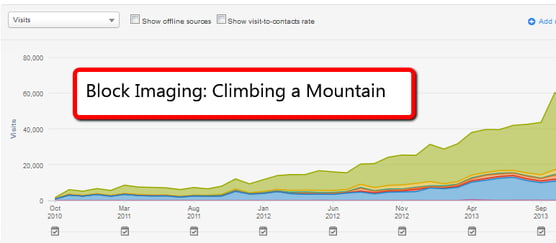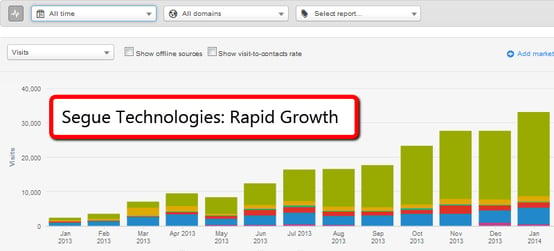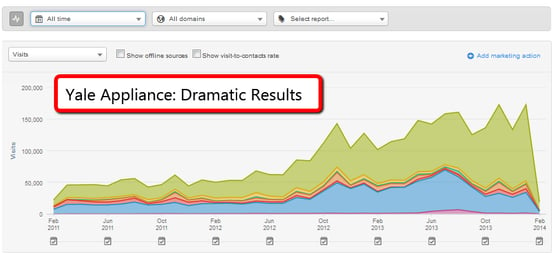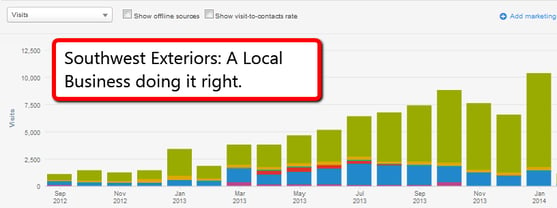Topics:
Content MarketingSubscribe now and get the latest podcast releases delivered straight to your inbox.
How to Give a Content Marketing Workshop that Gets Incredible Results

Feb 4, 2014

About 3 years ago I was asked by my good friend (at the time she was just a reader of this blog and we’d never met) Krista Kotrla to come out to her company (Block Imaging in Lansing Michigan) and help her solve a problem. Looking back, Krista’s problem was a preview of one of the most prolific issues facing businesses and content marketing today, which, in simple terms, is: How to achieve a company vision, culture, and buy-in of this “new” way of marketing (i.e. content marketing).
And to make a long story short, the reason why so many companies have problems when it comes to this shared vision, culture and buy-in comes down to a lack of understanding of 3 essential questions:
- What is content marketing?
- How is it done effectively?
- Why should each individual within the company be a part of it?
When it comes down to it, companies that take the time and effort to ensure their staff (content marketing participants) can clearly articulate the answers to these 3 questions will, in a very high percentage of the cases, experience exceptional results. (see Simon Sinek for more here)
 A photo taken at the first true "content marketing workshop" I ever gave to the great folks of Block Imaging.
A photo taken at the first true "content marketing workshop" I ever gave to the great folks of Block Imaging.
But if this shared understanding will ever be achieved, a content marketing workshop is far and away the most important initial step. In fact, as I’ve taken some time recently to truly dissect my most successful clients and case studies, this is what I found:
On average, a company that starts their content marketing campaign off with a workshop achieves over 300% more growth in traffic, leads, and new customers than a company that does not.
In case you didn’t catch that, I said 300%.
Pretty crazy, isn’t it? In fact, one could easily make the statement, “I don’t see how a few hours talking about content marketing would make such a big difference.”
And the truth is, I may have made the exact statement at one point and time. But as with all marketing experiments, the numbers don’t lie. And by this point, the numbers have sent me a clear message that is literally inarguable.
To make my point on this, throughout this post you’ll see screenshots of a few of my clients and their corresponding web/traffic growth after first taking the time to do a content marketing workshop with their staff and then leveraging said employees to produce content.
 What Block Imaging has done with content marketing is profound, but it all started with a simple workshop that would set the tone for incredible success ahead, going from <1000 visitors per month to 60k per month in just over 2 years time.
What Block Imaging has done with content marketing is profound, but it all started with a simple workshop that would set the tone for incredible success ahead, going from <1000 visitors per month to 60k per month in just over 2 years time.
8 Steps to Giving a Powerful and Effective Content Marketing Workshop
Assuming you want to do a workshop with your staff on getting started with content marketing, I have found there are 8 steps that will give you the greatest results—something that I’ve refined after giving dozens of these workshops to companies small and large over the past 3 years.
Part 1: Consumer Expectations have Changed:
In this section of the workshop, the purpose is to shift the mind of each attendee into “consumer” mode. In other words, we want them thinking about the way they use the internet, how their expectations have changed when they are researching and vetting companies online, and the feelings they experience when a website doesn’t give them what they’re looking for.
Part 2: The Way Google and Other Search Engines Work
Here’s a little secret—Outside of the tech/marketing world, a HUGE portion of people do not understand how search engines work. Nor can they articulate how and why Google ranks/shows some sites(pieces of content) over others.
Ultimately, the key to this section of the workshop is to help every person realize the goal of Google is to give its customer (the searcher) the best, most specific answer to their question (or need, problem, query, etc.) in that very moment. At the same time, even though Google wants to give great answers to their customers, most companies and industries don’t embrace this “teacher” mentality online, and therefore never get the “reward” from Google and its counterparts.
 Segue Technologies is doing some pretty amazing things with their content, something that started off in January of 2013 and have since established incredible traffic, lead, and sales growth by leveraging their employees for content.
Segue Technologies is doing some pretty amazing things with their content, something that started off in January of 2013 and have since established incredible traffic, lead, and sales growth by leveraging their employees for content.
Part 3: The Way Consumers Search and the “Big 5”
Most of you have heard me talk about the “Big 5” in the past, but they are essentially the main subjects that move the needle in every single industry, be it b2b, b2c, etc. The Big 5 are:
- Cost/price questions
- Problems/issues questions
- Vs/Comparison questions
- Review-based questions
- Best of questions
The key to this section is to help workshop attendees think about all the times they’ve used each one of these phrases while they were shopping/researching online. When done correctly, everyone in the room will be nodding their head again and again once they realize just how often they use the Big 5 in every aspect of their consumer-driven life. By coming to this understanding, they’ll also start to see how the Big 5 greatly apply to their existing prospects and customers.
Part 4: They Ask,You Answer: Group Brainstorm of Content Ideas
In this part of the workshop, the goal is to answer this question: What should we write about?
Instead of making it a science, the key comes down to listening well, hearing the problems, questions, and needs of prospects and customers, and then having a willingness to address each one (be it via text, vide, etc.).
Now that attendees understand the “They Ask, You Answer” philosophy, as well as how this coordinates so perfectly with the Big 5, the next step is to have them apply what they’ve learned by brainstorming questions they receive every day from prospects and clients.
This activity can have a profound impact on all participants, and as you might imagine, is usually dominated by those persons involved in sales, as they are the ones that generally have the closest contact with existing prospects and clients.
Also, I have found this activity works best when the group is divided into teams, creating a fun “competition” of sorts as to which group can come up with the most content ideas/questions.
 At almost 200k visitors a month, Yale Appliance is at the pinnacle of content marketing in their industry, but it all started with a workshop at the beginning of 2012.
At almost 200k visitors a month, Yale Appliance is at the pinnacle of content marketing in their industry, but it all started with a workshop at the beginning of 2012.
Part 5: The Impact Content can have on the Sales Process and Closing Rates
Remember earlier where we said employees need to understand “why” they’re being asked to participate in content marketing? Well, this section is a huge deal. As with everything else in life, people want to know WIIFT—What’s In It For Them.
By seeing the dramatic impact great content can have on shortening the sales cycle while bringing in more qualified leads and greater margins—sales people are generally VERY excited about the possibilities this could have on their bottom line and overall job performance.
Part 6: The Reason Why Everyone’s Voice, Talents, and Knowledge are Critical for Success
The essence of Part 6 is very simple—“Marketing” should not be the digital voice of the company. “Marketing” does not have their finger on the pulse on clients and customers like the rest of the company. Therefore, “Marketing’s” job (from this point forward) is to help employees (that actually deal with customers) produce content.
Essentially, upon hearing this each branch of the business needs to understand their overall value to the growth of the company, and why it’s critical the marketing department is able to lean on them for teaching, information, and other pieces of content.
 Focusing on windows, siding, and doors-- Southwest Exteriors of San Antonio took the time to involve all their employees in a content marketing workshop to start the campaign, and the results have been constant, steady growth.
Focusing on windows, siding, and doors-- Southwest Exteriors of San Antonio took the time to involve all their employees in a content marketing workshop to start the campaign, and the results have been constant, steady growth.
Part 7: The Editorial Guidelines Going Forward
Although this section won’t take up a lot of time, it’s very, very important. If employees are going to be participating in the company’s content marketing efforts, they’ll need to understand what the entire process and corresponding expectations look like. Here are just a few questions/topics that should be covered:
- Who is the Chief Content Officer? (the title of this position varies)
- How often will employees be asked to contribute content?
- What are the different ways in which the employees will be able to contribute content? (text, video, etc)
- What are the editorial guidelines for a typical blog post?
After employees are done with this section of the workshop they should have a clear road-map in their head of next steps, their individual roles, and expectations going forward.
Part 8: A Look into the Future as to the Impact this will make---Collectively and Individually
This section basically recaps everything that has been covered in the workshop up to this point, including the benefits to the company as a whole and to each employee as well. Also, I find a very powerful discussion point in this last section can be achieved by asking this simple question:
What would prevent this culture of content marketing from working with our organization?
Your Turn
Well there you have it folks—8 steps that, if done right, can make all the difference in kicking off a tremendous content marketing culture with any company—small or large. And in case you’re wondering, I have found this workshop generally lasts between 3-4 hours.
That being said, I’d love to hear your thoughts and questions on this. If you have experience with the subject of content marketing workshops, what would you add to the list? Also, I’d love to hear from anyone that is having trouble getting content marketing buy-in with their organization. If you fall in this category, I’d highly recommend you consider offering one of these workshops yourself, as you now have the steps to success. :-)
Note: I'd like to thank my amazing clients that allow me to show the great things they've done with their businesses. To see more of their content, visit their sites at:


Order Your Copy of Marcus Sheridan's New Book — Endless Customers!